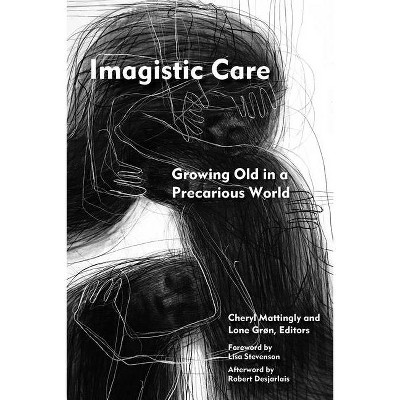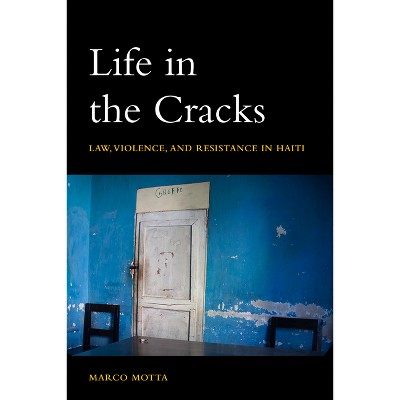The Work of Repair - (Thinking from Elsewhere) by Thomas Cousins (Paperback)

About this item
Highlights
- In the timber plantations in northeastern South Africa, laborers work long hours among tall, swaying lines of eucalypts, on land once theirs.
- About the Author: Thomas Cousins is Clarendon-Lienhardt Associate Professor in the Social Anthropology of Africa at the University of Oxford, and Fellow, St Hugh's College.
- 320 Pages
- Social Science, Anthropology
- Series Name: Thinking from Elsewhere
Description
About the Book
The Work of Repair is an ethnographic examination of the intimate relationships between laborers in the timber plantations of postapartheid South Africa, in the wake of the HIV crisis and the contentious politics of nutrition. It explores how capacity is augmented as the wounds of history are embodied and modulated.Book Synopsis
In the timber plantations in northeastern South Africa, laborers work long hours among tall, swaying lines of eucalypts, on land once theirs. In 2008, at the height of the HIV/AIDS crisis, timber corporations distributed hot cooked meals as a nutrition intervention to bolster falling productivity and profits. But life and sustenance are about much more than calories and machinic bodies. What is at stake is the nurturing of capacity across all domains of life--physical, relational, cosmological--in the form of amandla. An Nguni word meaning power, strength or capacity, amandla organizes ordinary concerns with one's abilities to earn a wage, to strengthen one's body, and to take care of others; it describes the potency of medicines and sexual vitality; and it captures a history of anti-colonial and anti-apartheid struggle for freedom.
The ordinary actions coordinated by and directed at amandla do not obscure the wounding effects of plantation labor or the long history of racial oppression, but rather form the basis of what the Algerian artist Kader Attia calls repair. In this captivating ethnography, Cousins examines how amandla, as the primary material of the work of repair, anchors ordinary scenes of living and working in and around the plantations. As a space of exploitation that enables the global paper and packaging industry to extract labor power, the plantation depends on the availability of creative action in ordinary life to capitalize on bodily capacity. The Work of Repair is a fine-grained exploration of the relationships between laborers in the timber plantations of KwaZulu-Natal, and the historical decompositions and reinventions of the milieu of those livelihoods and lives. Offering a fresh approach to the existential, ethical and political stakes of ethnography from and of late liberal South Africa, the book attends to urgent questions of postapartheid life: the fate of employment; the role of the state in providing welfare and access to treatment; the regulation of popular curatives; the queering of kinship; and the future of custom and its territories. Through detailed descriptions, Cousins explicates the important and fragile techniques that constitute the work of repair: the effort to augment one's capacity in a way that draws on, acknowledges, and reimagines the wounds of history, keeping open the possibility of a future through and with others.From the Back Cover
"Cousins's focus on repair points to the regenerative capacity of hope amid consuming violence, vulnerabilities, and despair. Thoughtfully argued and meticulous in detail, this book highlights why cultures of interconnection, inclusivity, impurities, and repair in South Africa and elsewhere are key to convivial theorization in Anthropology and kindred disciplines."--Francis B. Nyamnjoh, University of Cape Town
In the timber plantations in northeastern South Africa, laborers work long hours among tall, swaying lines of eucalypts, on land once theirs. In 2008, timber corporations distributed hot meals as a nutrition intervention to bolster falling productivity and profits. But life and sustenance are about more than calories. At stake is the nurturing of capacity across all domains of life in the form of amandla. An Nguni word meaning power, strength or capacity, amandla organizes ordinary concerns with one's abilities to earn a wage, strengthen one's body, and take care of others; it describes the potency of medicines and sexual vitality; and it captures a history of anti-colonial and anti-apartheid struggle for freedom. The ordinary actions coordinated by and directed at amandla do not obscure the wounding effects of plantation labor or the long history of racial oppression, but rather form the basis of repair. In this captivating ethnography, Cousins examines how amandla, as the primary material of the work of repair, anchors ordinary scenes of living and working in and around the plantations. The Work of Repair is a fine-grained exploration of relationships between laborers in South Africa's timber plantations. Offering a fresh approach to the existential, ethical and political stakes of ethnography in late liberal South Africa, the book attends to urgent questions of postapartheid life: the fate of employment; the role of the state in providing welfare and access to treatment; the regulation of popular curatives; the queering of kinship; and the future of custom and its territories. Cousins explicates the fragile techniques that constitute the work of repair: the effort to augment one's capacity in a way that draws on, acknowledges, and reimagines the wounds of history, keeping open the possibility of a future through and with others. Thomas Cousins is Clarendon-Lienhardt Associate Professor in the Social Anthropology of Africa at the University of Oxford.Review Quotes
To paint the complex character of the work of repair in South Africa and elsewhere, we need a story that is both rich in empirical details and capable of engaging in multivocal theoretical debates. Cousins's book is such a powerful contribution.-- "American Ethnologist"
The Work of Repair draws from a dazzling array of theories, concepts, and ideas from many different fields and disciplines.-- "Antipode: A Radical Journal of Geography"
. . .Cousins has written a powerful, often brilliant, empirically rich, and extremely provocative book that will be read with profit by many on and outside of the continent.-- "H-Net Reviews"
Cousins's focus on repair points to the regenerative capacity of hope amid consuming violence, vulnerabilities, and despair. Thoughtfully argued and meticulous in detail, this book highlights why cultures of interconnection, inclusivity, impurities, and repair in South Africa and elsewhere are key to convivial theorization in Anthropology and kindred disciplines.---Francis B. Nyamnjoh, University of Cape Town
About the Author
Thomas Cousins is Clarendon-Lienhardt Associate Professor in the Social Anthropology of Africa at the University of Oxford, and Fellow, St Hugh's College.










